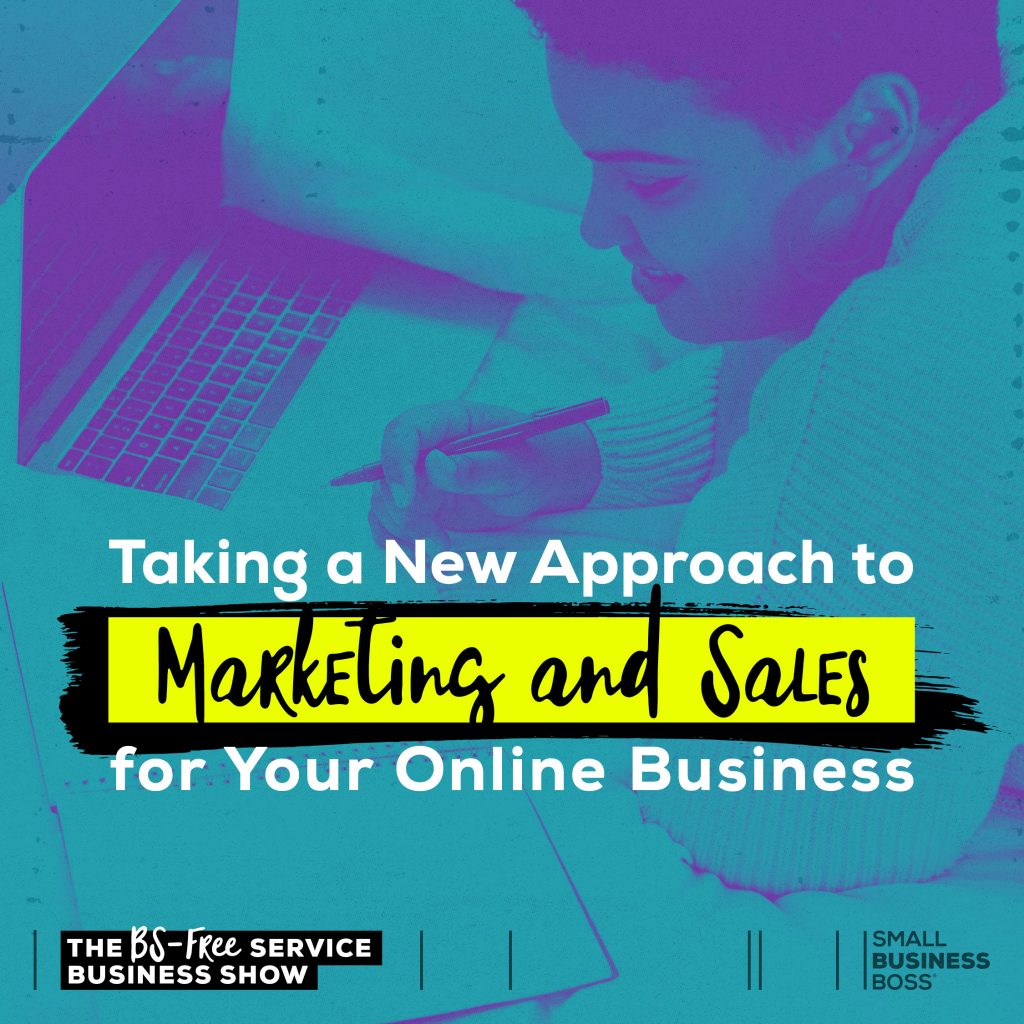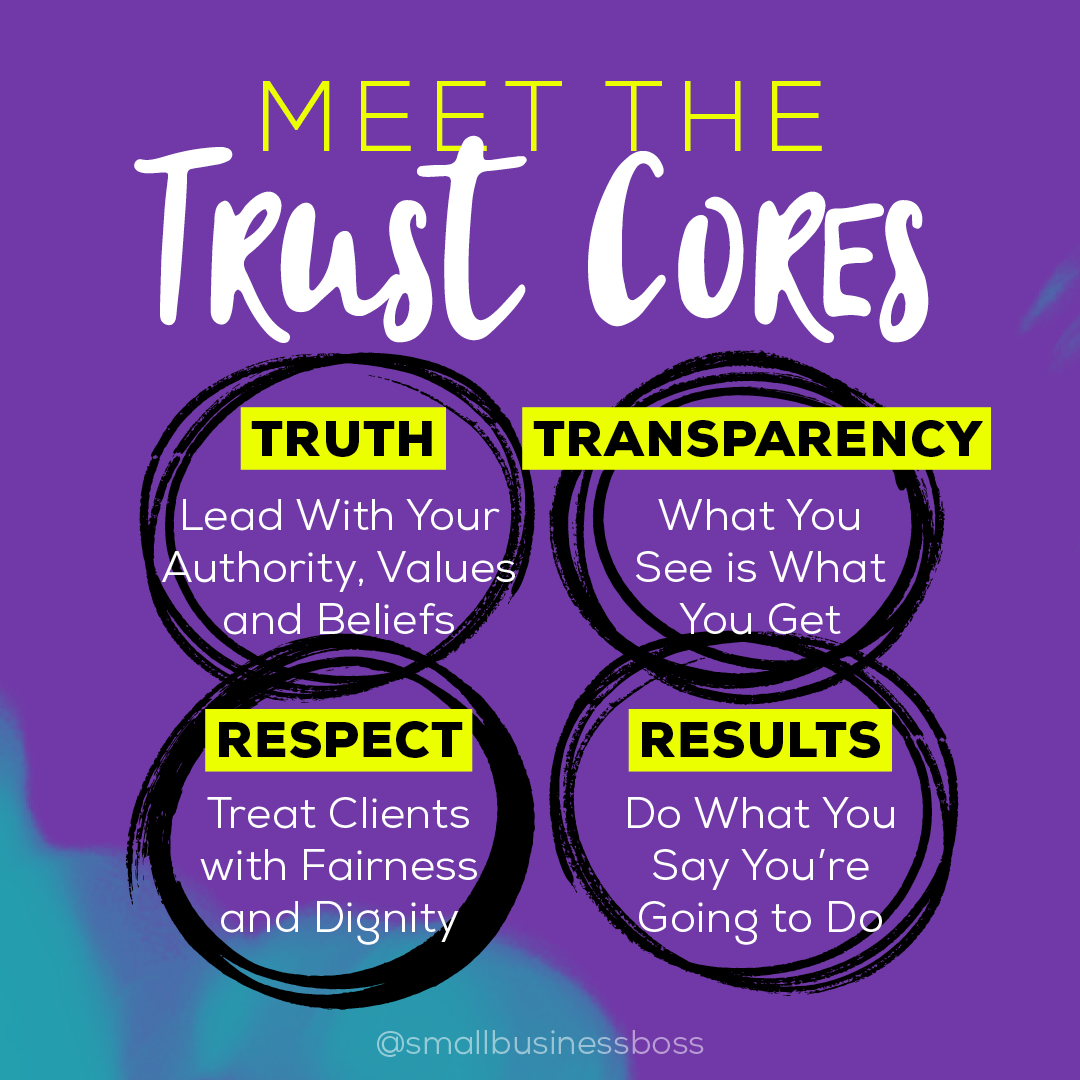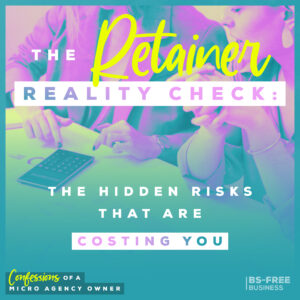
Search the site:
Taking a New Approach to Marketing and Sales for Your Online Business
When it comes to marketing and sales, there are so many different strategies and tactics you can use. It’s overwhelming, and frankly, many of them just aren’t the right ones for your business. But there’s one thing that matters more than any single tactic, and that’s trust. In this episode, we’re going to break down how to take a trust-driven approach to your marketing and sales.
As humans, there are a few things most of us hold sacred. For me one of the big ones is trust, which is why I’ve struggled with so many of the things I see in online business. Too often, the “normal” way of doing sales and marketing in the online business space is about building trust as quickly as possible.
Trust is not something to be gamified or manipulated. It’s something that needs to be earned. Which explains why so much of the status quo in online business makes so many of us uncomfortable.
This is why we need a new approach to sales and marketing for our online businesses. One that’s driven by trust.
Table of Contents
Reimagining the Know-Like-Trust Factor
I’m sure you’re familiar with the know-like-trust factor, which is what leads people to ultimately buy from you.
Conventional marketing and sales wisdom maps the know-like-trust factor with the customer journey, as a client goes from finding you, then growing to like you, and ultimately trusting you. As a content marketer, I completely agree with this in theory.
But I want to talk about how this works in practice in the online business space, as the problem I see isn’t around the know or like part of things, but rather with trust. The three areas aren’t equally weighed, and being known (and even liked) isn’t the problem for most online businesses, thanks to personality-driven marketing and many times, a relentless “be everywhere” strategy.
In the online space, the know and like can happen relatively quickly, but trust is much harder for people to earn. And without trust, it’s hard to make the sale.
Plus, trust is becoming harder for brands of all sizes to earn as the dynamics of trust have changed dramatically.
Which is why, as an industry, we’re dealing with a litany of tactics designed to short circuit our trust. The goal is to maintain the same velocity at which we come to know and like a brand. That way, we don’t think too hard about whether or not we trust the brand enough to do business with them.
The Shifting Dynamics of Trust
Trust has always been the basis of effective communication and strong relationships, but social media has changed everything.
In her book The Power of Trust, Natalie Doyle Oldfield, the creator of the Client Trust IndexTM speaks to the impact of social media on trust. “People are increasingly skeptical and more demanding; they expect truthful, timely and ethical communication, and they trust organizations less.”
Here in 2020, trust is collapsing with our institutions, our politics and each other. Writer David Brooks details this growing distrust in an August 2020 essay for the Atlantic.
In a climate where trust is eroding, earning trust is now more important than ever for each of us as business owners.
Especially as Edelman’s 2020 Trust Barometer found that trust is only second to price and affordability when it comes to buying from a new brand or becoming a loyal customer. If you’re not convinced, consider these other findings from the 2020 Trust Barometer report:
- 70% of respondents said that trusting a brand is more important now than in the past.
- Trust is more important than ever thanks to personal vulnerability (81%) and the societal impact of brands (74%).
- 58% want brands to be a positive force in shaping our culture, influencing acceptable behaviors and attitudes, and elevating those who are inspirational to others.
While you may not think of yourself as a brand, your business IS a brand and earning your potential clients’ trust matters. In fact, trust can very easily be your biggest competitive advantage.
Why? In his book, The Speed of Trust, Stephen M.R. Covey, talks about the trust tax and the trust dividend. When trust is low, we’re paying a tax which increases the cost of doing business. On the flip side, when trust is high, we get a dividend that multiplies our performance.
As Covey explains, trust isn’t just why people do business with us, it’s a multiplier. You can have “good strategy and good execution and get derailed by low trust.”
In short, trust has the power to make the difference between good and great in our businesses. And in an industry that’s flooded with tactics that are misleading and manipulative, it gives us a way to stand out.
We can use trust as a counterpoint to help us build better businesses.
What Contribution Can I Make?
Earlier this year, I laid out the problems I see in the online business industry in an epic essay called The Dark Side of Online Business: A Call for the Status Quo to Change.
After publishing that essay, there was one conversation I found myself having again and again. People were happy to see these problems defined and articulated, but they wanted to know how they could do business differently. How they could untangle themselves from the toxic sales and marketing tactics that are rampant in the online business world.
Plus, I was extremely cognizant when publishing that essay, and in the weeks that followed, that there are parts of what I talked about in my essay that are best left to qualified experts. Take for example, mindset manipulation. While I can speak to it based on my personal experiences, I’m far from being an expert.
I believe in taking my own medicine, which means if I’m going to talk about people inventing authority, I need to ensure that any solutions I propose are based on not just my lived experience, but my professional skills and core competencies.
Looking at my background in communications particularly PR and marketing, as well as years of experience in sales and working with clients, there was one common thread in all of it.
Trust.
As a PR pro for years, my role was to identify stories and place them with the media in order to build trust for brands. To do that, I had to ensure that the brand would be able to build thought leadership that would stand up to fact checking by the media.
Then, as a content marketer and copywriter, I was tasked with building trust to help support the sales process, and do it in a way that creates loyal, lasting customer relationships.
On top of that, I’ve been running some type of business for more than 15 years. I’ve learned exactly how to earn the trust of my community and my clients, and then how to maintain it.
Today, I’m putting my stake in the ground around how trust is the piece of the puzzle I can own. The part I’m an authority on, and that I have years of experience to backup.
Taking a Trust-Driven Approach to Your Marketing and Sales
Now, back to trust as a way to differentiate yourself. I’m not going to deny that the know or like part of the know-like-trust equation is important.
However, in online business the game is really about getting as many people to know and like you as possible. Then, the goal is to trick you into trusting them so they can make the sale.
As someone with two successful businesses, I’ve learned this “be everywhere” ploy is completely needless. When you focus on trust, you require fewer people at the top of the “funnel”, and you’re able to do business differently.
Remember, a service business isn’t a mass market play. You need 100 true fans, not 1000s.
Plus, I’d argue that in the online world, in many cases people will only like you once they actually trust you. Speaking from personal experience here, I may trust you, but it takes me longer to decide I like someone.
The good news is that I plan on going into much, much more detail on all of this in the future. But for starters, I want to lay out what a trust-driven approach to your marketing and sales really looks like.
For online businesses, I’ve defined four core areas that you need to build high levels of trust with your potential clients through your sales and marketing. (These also apply to your existing clients, but that’s for another episode.)
Each of these are based on both my personal experiences, years of work as a communication professional, and some research to back it all up. I’ve included a list of resources at the end of this post to give credit to my teachers.
Trust Core #1: Truth
It should go without saying, but telling the truth is at the very heart of trust. We all know what it’s like when people are less than truthful with us, and how quickly that can erode our trust.
In the online business world, for many people inventing authority is the name of the game. They manufacture everything from credentials to revenue claims, making it challenging for people to know who to trust.
In the context of business, truth comes down to building authority based on what you’re actually qualified to do. What are your capabilities? Your professional experiences? Own that and don’t apologize for it.
In a world where people are constantly exaggerating, and in some cases, lying, telling the truth has far more value than any of us realize.
The other component of truth comes down to your values and beliefs. By aligning your integrity with your values and beliefs, you’re able to create a consistent experience with your brand. Because nothing will tank trust faster than someone who says one thing and does another.
Trust Core #2: Transparency
Have you ever had the experience of being wooed by an online business, only to get on the inside of a course or program to realize it was all a sham?
When it comes to transparency, it should be a case of ensuring that what your potential clients see, is what they get.
Transparency isn’t about airing all your dirty laundry, but instead sharing information people need to know.
For example, celebrity entrepreneurs make revenue claims as a way to garner trust and demonstrate expertise. However, many times, these revenue claims are untrue, and actually completely unnecessary for them to share at all.
They’re sharing revenue claims as a way to signal transparency, instead of doing the work required to be truly transparent where it matters most.
Think about it from your client’s perspective. Pricing is a critical factor in their decision making (and it’s actually more important to them than trust), yet a number of pricing tactics are commonly used in the industry to hide the price.
When it comes to pricing, transparency is telling people the exact costs, as well as being clear on what they will and won’t get once they purchase.
Finally, let’s be clear on what transparency is not. It’s not curating your vulnerability in a way that manipulates your audience. It’s not sharing a dramatic (or worst yet, traumatic) story in an effort to get attention.
Transparency is being straightforward and equipping potential clients with what they need to make the right decision for them.
As a service provider, this means supporting them through every step of the sales process by answering questions, being forthcoming when it’s a poor fit, managing their expectations and more.
Trust Core #3: Respect
Which brings me to respect. If you want people to truly trust you and your brand, they need to feel respected.
In the online business world, there’s a rampant lack of respect for potential clients and customers. In my dark side essay, many of the stories that were shared with me underscore a complete lack of respect for potential customers.
The high pressure sales tactics such as luxury pricing and forcing a decision with scarcity, disregard respect for the prospective client. These tactics push people into making a decision that has very little to do with trust, and everything to do with fear.
When it comes to respect, you need to ask what your underlying intent is when you use any marketing or sales strategy. The goal should be to create a situation that’s a mutual win and that treats people with dignity.
This is why the “invest at all costs” story that’s so prevalent is so very problematic. It’s incredibly disrespectful of your potential customer’s budget. We must trust that people know what’s right for them, and respect them enough to let them decide without our interference.
As a creative, consultant or agency owner, opportunities to demonstrate respect for your potential clients can show up in many different ways. For me, this often looks like being respectful of their time, their budgets and giving them the space to make a decision that feels good for them. It’s being clear and complete in my proposals, and thoughtful in my follow-up.
While you can get the sale without respect, you’re in for a host of other problems once someone is doing business with you. The last thing you ever want is for your client to have buyer’s remorse.
Trust Core #4: Results
The final component of trust is results. As professionals, we need to be able to do what we say we’re going to do, and not overpromise in the process.
Think about how social proof is used in the online business world to create trust. Many times it backfires as the results shown aren’t at all typical. For each person that buys into this, many others stop and think “this is too good to be true.” Their intuition kicks in and they slowly back away.
That’s exactly what you don’t want.
You want to use results to earn trust, as it not only reinforces your credibility and expertise, but also shows a track record of success.
Plus, you need to clearly communicate what is and isn’t possible with the work you do. In the Speed of Trust, Covey writes about how taking ownership of results is essential to building trust, even if those results aren’t good.
Let’s say you’re a copywriter, and a client asks if you can guarantee results from the copy you’re creating for their launch. In the majority of cases you’re not going to be able to guarantee the outcomes as you don’t have control over all the inputs. You simply can’t guarantee the result, but you can speak to a pattern of past successful launches.
Earning Trust is Vital
Earning your potential client’s trust is more important now than ever. Use these four areas: truth, transparency, respect and results to ensure you’re doing what it takes to create trust, and doing the right thing as a business owner.
Best of all, the trust cores outlined above are either no or low cost, and they’re relatively easy to execute. In no way am I advocating for everyone to abandon the “know” part of the puzzle, but rather to carefully consider the real role of trust in your marketing and sales.
When we operate from a place that’s committed to truly earning the trust of our potential clients, we’re shifting how business is done. We’re putting people before our profits, and acting with integrity.
This is the starting point, so we’ll be talking about this more and more in the coming weeks and months. Until then, I look forward to hearing about how you’re going to put this into action.
Additional Resources
As always, my work and research in this realm has been informed by many different sources, as well as my 20+ years of professional experience. I believe in crediting my teachers, so here are additional resources:
- Edelman Trust Barometer
- Emotional Intelligence for Sales Success, Colleen Stanley
- How Clients Buy, Tom McMakin and Doug Fletcher
- The Power of Trust, Natalie Doyle Oldfield
- The Speed of Trust, Stephen MR Covey

I’m Maggie Patterson (she/her), and services businesses are my business.
I have 20+ years of experience with client services, am a consultant for agency owners, creatives, and consultants, and vocal advocate for humane business practices rooted in empathy, respect, and trust.
Read or Listen to the Latest
For Solo Business Owners

Growing a solo service business is tough.
It’s even harder when you’re bombarded with BS advice that steers you away from your values and why you started your business in the first place.
This is the podcast for solo creatives and consultants who want to remain as a team of one and have zero interest in the hustle and grind of typical business teachings.
Subscribe now and never miss an episode.
For Micro Agency Owners
Most podcasts for agency owners obsess over revenue growth as the ultimate success metric.

But here’s the truth: not everyone wants to make millions. Your goal might be to build a sustainable business that lets you have a life and doesn’t run you into the ground.
Join me as I spill my shameless confessions and share everything I’ve learned about building a micro agency that skips the BS of tired and typical agency teachings.
Follow Now on All Major Podcast Platforms








